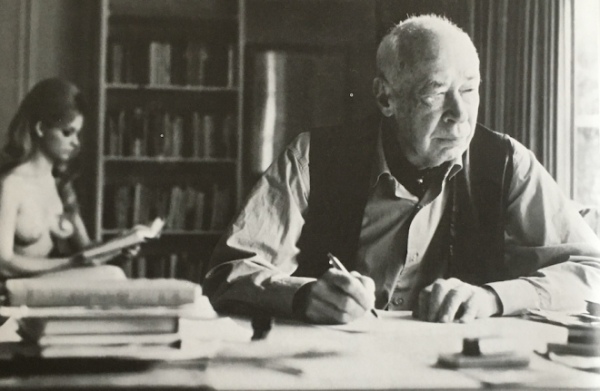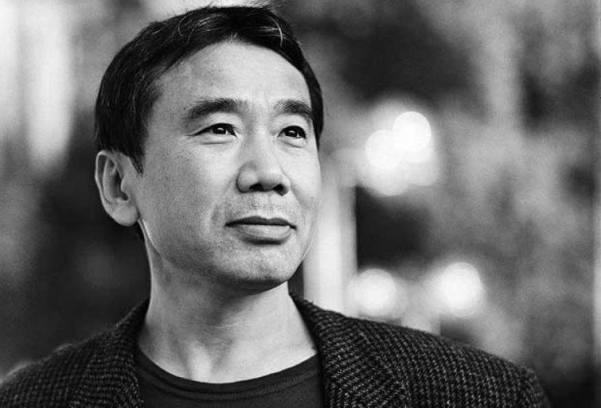“There are two states in which you may exist, person who writes, or person who does not. If you write: you are a writer. If you do not write: you are not. Aspiring is a meaningless null state that romanticizes Not Writing. It’s as ludicrous as saying, ‘I aspire to pick up that piece of paper that fell on the floor.’ Either pick it up or don’t,” bitingly irreverent author, blogger, and comic book contributor Chuck Wendig once wrote. Aspiring novelist. Aspiring poet. Aspiring playwright. How many of these would-be writers simply “aspire” and how many actually write? If you want to boldly embark on the adventure of becoming a bonafide writer instead of merely long to be one, heed the wise advice of these literary masters.
1. write everyday, even when you don’t feel like it

While working on what would be his first novel, Tropic of Cancer, Henry Miller established a stringent daily routine: in the mornings and afternoons, he’d write diligently, in the evenings— if tired— he’d visit friends, go to the cinema, or read a lovely book in a cafe. In his much beloved 11 commandments of writing, he outlines the series of maxims meant to direct his conduct. My personal favorite is commandment four: “Write according to program and not according to mood!” Whenever I’m overcome by distraction or listlessness, by the painful yearning to be somewhere, anywhere, besides at my desk, I remember the way Miller was so strict with himself.
We can all learn from Mr. Miller’s no-nonsense approach to creative work. If we’re to write, we must not only institute a plan for our daily labor but possess the discipline to follow through. More important than literary brilliance or innate artistic talent is a tireless dedication to the work. No matter how much we romanticize art as a mystical conspiring with the muses, the most productive artists will be the first to confess their impressive creative output is the result not of “inspiration”— that enthralling state that so often eludes— but of earnest effort. So practice the unwearied persistence of Henry Miller and begin writing everyday. Doing so will teach you that you can write without a “muse.”
2. set concrete goals

A brief perusal of literary history will reveal the most prolific writers set concrete, measurable goals. Regarded as one of the greatest writers of the 20th century, Graham Greene required himself to write 500 words daily:
“Over twenty years I have probably averaged five hundred words a day for five days a week. I can produce a novel in a year, and that allows time for revision and the correction of the typescript. I have always been very methodical, and when my quota of work is done I break off, even in the middle of a scene.”
When English novelist Michael Korda happened to witness Greene at work in the summer of 1950, he marveled at the remarkable orderliness of his process:
“An early riser, he appeared on deck at first light, found a seat in the shade of an awning, and took from his pocket a small black leather notebook and a black fountain pen, the top of which he unscrewed carefully. Slowly, word by word, without crossing out anything, and in neat, square handwriting, the letters so tiny and cramped that it looked as if he were attempting to write the Lord’s Prayer on the head of a pin, Graham wrote, over the next hour or so, exactly five hundred words. He counted each word according to some arcane system of his own, and then screwed the cap back onto his pen, stood up and stretched, and, turning to me, said, “That’s it, then. Shall we have breakfast?” I did not, of course, know that he was completing The End of the Affair, the controversial novel based on his own tormenting love affair, nor did I know that the manuscript would end, typically, with an exact word count (63,162) and the time he finished it (August 19th, 7:55 A.M., aboard Elsewhere).
Greene’s self-discipline was such that, no matter what, he always stopped at five hundred words, even if it left him in the middle of a sentence. It was as if he brought to writing the precision of a watchmaker, or perhaps it was that in a life full of moral uncertainties and confusion he simply needed one area in which the rules, even if self-imposed, were absolute.”
Much like Graham Greene, master of horror Stephen King is methodical about his writing regimen, beginning his scribing first thing in the morning with a cup of tea and setting a 10 page goal for himself. As is common among writers, King’s morning routine takes on the sanctity of ritual:
“I have my music, sit in the same seat, and the papers are all arranged in the same places. The cumulative purpose of doing these things the same way every day seems to be a way of saying to the mind, you’re going to be dreaming soon.”
1 page. 5 pages. Why is it imperative for writers to set such quantifiable targets? Legendary authors impose these kinds of page limits on themselves because pages are a concrete measurement of productivity and, thus, an easy way to track progress along the route to a larger goal. Not to mention word counts hold us accountable. 500 words. 1,000 words. No matter what your personal goal, write it down and stick to it. Even if your aim is as modest as Hemingway’s ambition to write one true sentence, over time, your sentences will accumulate into a treasure trove of material.
3. get active

Many of the most distinguished artists report exercise helps them unlock hidden reserves of creativity. Japanese novelist Haruki Murakami is one such example. He rises everyday at 4 am, writes, runs several miles, and then returns to his paper and pencil. The highly repetitive monotony of physical motion is often enough, he claims, to distract his rational mind so the more powerful subconscious can perform its work. Such strenuous physical activities provide the blocked writer with a brief cognitive respite, a momentary oasis where he is no longer restrained by the conventional modes of conscious thought. So if you want to write, pump your arms, take the stairs, do squats— just get up!
Pingback: Joyce Carol Oates on the Myth of Mood – asia lenae
Pingback: Anne Sexton’s Advice to Young Writers – asia lenae
Pingback: Maya Angelou’s Writing Routine & the Exquisite Torment of the Creative Life – asia lenae
Pingback: Dorothea Brande’s 15 Minute Rule – asia lenae
Pingback: Dorothea Brande’s 15 Minute Rule – asia lenae
Pingback: Make a Date with the Muse: Writing as Commitment | The Blank-Faced Confidante